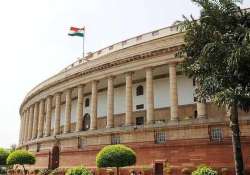Place CVC, CBI's anti-corruption wing under Lokpal: Parl panel
New Delhi: Citing overlapping of functions, a Parliamentary Committee on Monday recommended integrating Central Vigilance Commission and anti-corruption wing of the CBI to work directly under the command and control of Lokpal to deal with

New Delhi: Citing overlapping of functions, a Parliamentary Committee on Monday recommended integrating Central Vigilance Commission and anti-corruption wing of the CBI to work directly under the command and control of Lokpal to deal with corruption cases.
It also suggested inclusion of leader of single largest opposition party in Lok Sabha, in case there is no recognised Leader of Opposition, as member of selection panel to choose chairperson and members of Lokpal.
If this recommendation is accepted by Parliament, it will pave the way for Congress leader Mallikarjuna Kharge to be part of Lokpal selection committee headed by Prime Minister.
"The Committee is of the view that institutions of CVC and the CBI (in so far as its anti-corruption functions are concerned), be fully integrated with Lokpal and the institution of anti-corruption watchdog may be architecturally created vertically with the Lokpal at the apex level and CVC and CBI (anti-corruption wing) working directly under its command and control.
"The functions of Lokpal and CVC be clearly specified and overlap between functions and powers of CVC and Lokpal be addressed. Lokpal in turn should utilise these organisations for conduct of inquiry, investigation and prosecution," the panel said in its report submitted to both the Houses of Parliament.
The Parliamentary Standing Committee on Personnel, Public Grievances, Law and Justice, headed by Congress MP E M Sudarsana Natchiappan, felt that public disclosure of assets and liabilities of public servants, including employees and politicians, may not be necessary.
It recommended review of existing rules, which reflect "colonial mindset of doubt and mistrust", on declaration of assets and liabilities by a government servant as they are "at present being used more to harass government servants than as a safeguard against corruption".
Suggesting uniformity in provisions for such declarations, the panel recommended "use of digital surveillance software to detect any disproportionate growth in assets and liabilities of a public servant beyond his known sources of income".